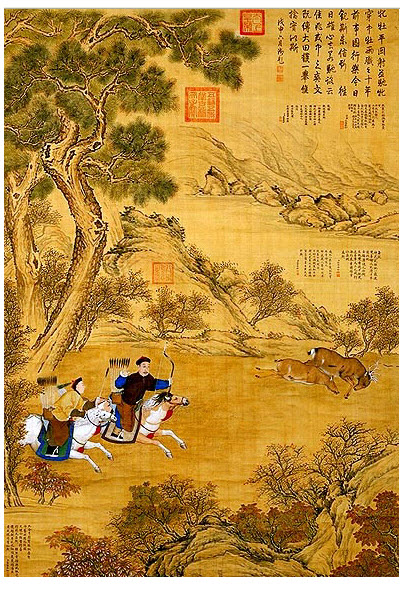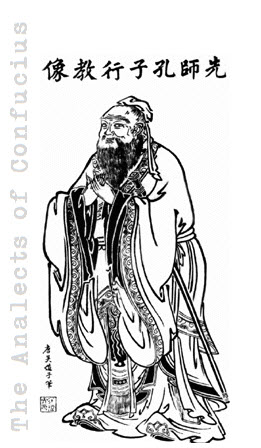Find the complete text of the Analects of Confucius.

BOOK XVI
Against Intestine Strife—Good and Bad Friendships
The Chief of the Ki family was about to make an onslaught upon the
Chuen-yu domain.
Yen Yu and Tsz-lu in an interview with Confucius told him, "The Ki is about to have an affair with Chuen-yu."
"Yen," said Confucius, "does not the fault lie with you? The Chief of Chuen-yu in times past was appointed lord of the East Mung (mountain); besides, he dwells within the confines of your own State, and is an official of the State-worship; how can you think of making an onslaught upon him?"
"It is the wish of our Chief," said Yen Yu, "not the wish of either of us ministers."
Confucius said, "Yen, there is a sentence of Cháu Jin which runs thus: 'Having made manifest their powers and taken their place in the official list, when they find themselves incompetent they resign; if they cannot be firm when danger threatens the government, nor lend support when it is reeling, of what use then shall they be as Assistants?'—Besides, you are wrong in what you said. When a rhinoceros or tiger breaks out of its cage—when a jewel or tortoise-shell ornament is damaged in its casket—whose fault is it?"
"But," said Yen Yu, "so far as Chuen-yu is concerned, it is now fortified, and it is close to Pi; and if he does not now take it, in another generation it will certainly be a trouble to his descendants."
"Yen!" exclaimed Confucius, "it is a painful thing to a superior man to have to desist from saying, 'My wish is so-and-so,' and to be obliged to make apologies. For my part, I have learnt this—that rulers of States and heads of Houses are not greatly concerned about their small following, but about the want of equilibrium in it—that they do not concern themselves about their becoming poor, but about the best means of living quietly and contentedly; for where equilibrium is preserved there will be no poverty, where there is harmony their following will not be small, and where there is quiet contentment there will be no decline nor fall. Now if that be the case, it follows that if men in outlying districts are not submissive, then a reform in education and morals will bring them to; and when they have been so won, then will you render them quiet and contented. At the present time you two are Assistants of your Chief; the people in the outlying districts are not submissive, and cannot be brought round. Your dominion is divided, prostrate, dispersed, cleft in pieces, and you as its guardians are powerless. And plans are being made for taking up arms against those who dwell within your own State. I am apprehensive that the sorrow of the Ki family is not to lie in Chuen-yu, but in those within their own screen."
"When the empire is well-ordered," said Confucius, "it is from the emperor that edicts regarding ceremonial, music, and expeditions to quell rebellion go forth. When it is being ill governed, such edicts emanate from the feudal lords; and when the latter is the case, it will be strange if in ten generations there is not a collapse. If they emanate merely from the high officials, it will be strange if the collapse do not come in five generations. When the State-edicts are in the hands of the subsidiary ministers, it will be strange if in three generations there is no collapse.
"When the empire is well-ordered, government is not left in the hands of high officials.
"When the empire is well-ordered, the common people will cease to discuss public matters."
"For five generations," he said, "the revenue has departed from the ducal household. Four generations ago the government fell into the hands of the high officials. Hence, alas! the straitened means of the descendants of the three Hwan families."
"There are," said he, "three kinds of friendships which are profitable, and three which are detrimental. To make friends with the upright, with the trustworthy, with the experienced, is to gain benefit; to make friends with the subtly perverse, with the artfully pliant, with the subtle in speech, is detrimental."
Again, "There are three kinds of pleasure which are profitable, and three which are detrimental. To take pleasure in going regularly through the various branches of Ceremonial and Music, in speaking of others' goodness, in having many worthy wise friends, is profitable. To take pleasure in wild bold pleasures, in idling carelessly about, in the too jovial accompaniments of feasting, is detrimental."
Again, "Three errors there be, into which they who wait upon their superior may fall:—(1) to speak before the opportunity comes to them to speak, which I call heedless haste; (2) refraining from speaking when the opportunity has come, which I call concealment; and (3) speaking, regardless of the mood he is in, which I call blindness."
Again, "Three things a superior should guard against:—(1) against the lusts of the flesh in his earlier years while the vital powers are not fully developed and fixed; (2) against the spirit of combativeness when he has come to the age of robust manhood and when the vital powers are matured and strong, and (3) against ambitiousness when old age has come on and the vital powers have become weak and decayed."
"Three things also such a man greatly reveres:—(1) the ordinances of Heaven, (2) great men, (3) words of sages. The inferior man knows not the ordinances of Heaven and therefore reveres them not, is unduly familiar in the presence of great men, and scoffs at the words of sages."
"They whose knowledge comes by birth are of all men the first in understanding; they to whom it comes by study are next; men of poor intellectual capacity, who yet study, may be added as a yet inferior class; and lowest of all are they who are poor in intellect and never learn."
"Nine things there are of which the superior man should be mindful:—to be clear in vision, quick in hearing, genial in expression, respectful in demeanor, true in word, serious in duty, inquiring in doubt, firmly self-controlled in anger, just and fair when the way to success opens out before him."
"Some have spoken of 'looking upon goodness as upon something beyond their reach,' and of 'looking upon evil as like plunging one's hands into scalding liquid';—I have seen the men, I have heard the sayings.
"Some, again, have talked of 'living in seclusion to work out their designs,' and of 'exercising themselves in righteous living in order to render their principles the more effective';—I have heard the sayings, I have not seen the men."
"Duke King of Ts'i had his thousand teams of four, yet on the day of his death the people had nothing to say of his goodness. Peh-I and Shuh-Ts'i starved at the foot of Shau-yang, and the people make mention of them to this day.
'E'en if not wealth thine object be,
'Tis all the same, thou'rt changed to me.'
"Is not this apropos in such cases?"
Tsz-k'in asked of Pih-yu, "Have you heard anything else peculiar from your father?"
"Not yet," said he. "Once, though, he was standing alone when I was hurrying past him over the vestibule, and he said, 'Are you studying the Odes?' 'Not yet,' I replied. 'If you do not learn the Odes,' said he, 'you will not have the wherewithal for conversing,' I turned away and studied the Odes. Another day, when he was again standing alone and I was hurrying past across the vestibule, he said to me, 'Are you learning the Rules of Propriety?' 'Not yet,' I replied. 'If you have not studied the Rules, you have nothing to stand upon,' said he. I turned away and studied the Rules.—These two things I have heard from him."
Tsz-k'in turned away, and in great glee exclaimed, "I asked one thing, and have got three. I have learnt something about the Odes, and about the Rules, and moreover I have learnt how the superior man will turn away his own son."
The wife of the ruler of a State is called by her husband "My helpmeet." She speaks of herself as "Your little handmaiden." The people of that State call her "The prince's helpmeet," but addressing persons of another State they speak of her as "Our little princess." When persons of another State name her they say also "Your prince's helpmeet."
|
|
